I have written before of my relationship with my local coffee shop, Villiage Wine and Coffee. I am there every day that I work, and most days that I’m not at the store. They start making my drink before I reach the counter; they draw a picture on my cup daily, they provide breakfast now and stock the oatmeal that has all the berries because it’s all I eat, etc. They are closed for the week to refinish their floors and I am bereft.
They are only closed until Friday, when they’ll reopen with a shiny new floor. But the lack of them in my week has gotten me thinking about how I’ve come to need them. Yes, I love coffee, but it’s so much more than that. Kevin’s, as we all call it, is where I go to see friends and get hugs. I can get caught up on news in the village by going there and I never know who will be there that I know and enjoy. Kevin and I talk about the plight of small businesses in this world of people getting everything online cheaper but at a steeper personal cost.
Again, I am reminded of the importance of shopping at the places you want to stay open. In our small village with our collection of a dozen or shops, there is a deep reliance on our core customers. We feel the lack of each one when they move, or when they get an e-reader and stop buying books. Yes, I know they can buy e-books from us, but most prefer to go to Amazon or iTunes. I guess this week I’m getting a preview of what would happen if the coffee shop ever closed. And I do not like my world without it.
I had an idea for the village stores to make a point about how much they are needed. I wondered what would happen if we all closed for one day, or even half a day. And rather than being open we would explain to customers the importance of them choosing us over online shopping. I wanted the total dramatic effect of shuttered stores for the day with OUT OF BUSINESS signs in the windows. I wanted people to see just what it would feel like if we all closed. I know people have the best intentions about where they spend their money. But it’s easy to get caught up in the ease of online shopping and forget that every dollar spent online is a dollar that your local store needs. Not only does the local store need it, but more of that dollar stays in your town. I envision a day where everyone gets it and realizes that where you spend every retail actually really does matter.
For now, I will try to remember to make extra coffee at home to bring to work and count the days until Friday.
Fabulous First Lines 2014, Round 2
Elizabeth Bluemle - April 18, 2014
 Last week, I posted some of the best, most fun, striking, and otherwise notable opening lines from this year’s middle grade and young adult novels. This week, intrepid Flying Pig staffers Sandy and David helped me gather the next round. And at the end of the post are lines offered last week by alert ShelfTalker readers. Keep ’em coming, folks!
Last week, I posted some of the best, most fun, striking, and otherwise notable opening lines from this year’s middle grade and young adult novels. This week, intrepid Flying Pig staffers Sandy and David helped me gather the next round. And at the end of the post are lines offered last week by alert ShelfTalker readers. Keep ’em coming, folks!
“Okay. I got one. Would you rather live every day for the rest of your life with stinky breath or lick the sidewalk for five minutes?” Noodles asked. —When I Was the Greatest by Jason Reynolds (S&S / Atheneum)
There is an uneasiness that remains after your best friend tries to kill you. —The School of Good and Evil: A World Without Princes by Soman Chainani (Harper)
I never set out to pose nude. I didn’t, honestly. —A Mad, Wicked Folly by Sharon Biggs Waller (Viking)
There are six teams today in the Eastern Shore Baseball League. Tomorrow there will be none. —The Right Fight (World War II, Book 1) by Chris Lynch (Scholastic)
My art teacher says that a real artist bleeds for her craft, but he never told us that blood can become your medium, can take on a life of its own and shape your art in vile and gruesome ways. —Unhinged by A.G. Howard (Abrams / Amulet)
Grandpa stopped speaking the day he killed my brother, John. —Bird by Crystal Chan (S&S / Atheneum)
The empty cafeteria table snapped in half at the middle and shot up off the ground. —The Quantum League: Spell Robbers by Matthew J. Kirby (Scholastic)
The crackle and hiss of the flames devouring our house couldn’t block out the screaming and wailing of those who were still alive. —Defy by Sara B. Larson (Scholastic)
That’s the trouble with milking french fries—slippery elbows. —Zits: Shredded by Jerry Scott and Jim Borgman (HarperTeen)
Listen—I was alive once and then I wasn’t. Simple as that. Now I’m alive again. The in-between part is still a little fuzzy, but I can tell you that, at some point or another, my head got chopped off and shoved into a freezer in Denver, Colorado. —Noggin by John Corey Whaley (S&S / Atheneum)
The first thing we had to do was catch the Tralfamosaur. —The Eye of Zoltar by Jasper Fforde (Houghton Mifflin Harcourt)
The problem, or thrill, depending on how you choose to look at it, was that our relationship was practically based on an enthusiastic mendacity. —little blue lies by Chris Lynch (Simon & Schuster)
J. Rutherford Pierce smiled as the six mercenaries filed into his London office. —39 Clues Unstoppable Book 2: Breakaway by Jeff Hirsch (Scholastic)
I was raised to marry a monster. —Cruel Beauty by Rosamund Hodge (HarperCollins / Balzer + Bray)
In musicals, characters break into song when their emotions get to be too big. —Five, Six, Seven, Nate! by Tim Federle (Simon & Schuster)
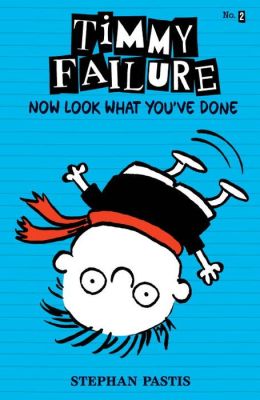
The night heat melted over me, the quiet unsettling since the laughter had stopped. —The Lure by Lynne Ewing (HarperCollins / Balzer + Bray)
Outlaws have too many feathers in their hats. —The Hero’s Guide to Being an Outlaw by Christopher Healy (HarperCollins / Walden Pond)
The natural and the supernatural inhabit the same world, intersecting but largely unseen to one another, like lodgers who share a house but keep different hours, only occasionally passing on the narrow stairs. —When They Fall, So Do We All by Charlie Fletcher (Little, Brown / Orbit)
I’m having my favorite dream again—the one where I’m about to be crowned Greatest Underwater Wrestling Champion of the World, Ever. —Shark School: Deep-Sea Disaster by Davy Ocean (Simon & Schuster)
Lucia was sure that the white-haired gentleman reclining on the dining couch before her would make a delightful grandfather. As a future husband, though, he left a great deal to be desired. —Curses and Smoke by Vicky Alvear Shecter (Scholastic / Arthur A. Levine)
Presumed dead does not mean dead. They didn’t find his body. —Swim That Rock by John Rocco & Jay Primiano (Candlewick)
The man in the fog was watching her. —Ore: The Foundry’s Edge by Cam Baity and Benny Zelkowicz (Disney-Hyperion)
If there was one thing worse than seeing a giant’s head rise from the ground, it was seeing two giant heads. —Odin’s Travels (The Blackwell Pages) by K.L. Armstrong & M.A. Marr (Little, Brown)
Epigraph from Part One: A Girl of Wax: Nothing is more enjoyable than educating a young thing—a girl of eighteen or twenty, as pliable as wax. —Adolf Hitler —Prisoner of Night and Fog by Anne Blankman (HarperCollins/Balzer+Bray)
Deep in the black mountains, deep in the Romanian night, deep beneath the cold, dark waters of the ancient Olt, the river witches sang. —Deep Blue by Jennifer Donnelly (Disney Book Group)
ShelfTalker reader Deb Marshall contributed this marvelous entry:
 Twelve–year–old Dorothea Barnes was thoroughly un–chosen, not particularly deserving, bore no marks of destiny, lacked any sort of criminal genius, and could claim no supernatural relations. Furthermore, she’d never been orphaned, kidnapped, left for dead in the wilderness, or bitten by anything more bloodthirsty than her little sister. —Ninja Librarians: The Accidental Keyhand by Jenn Swann Downey (Sourcebooks Jabberwocky)
Twelve–year–old Dorothea Barnes was thoroughly un–chosen, not particularly deserving, bore no marks of destiny, lacked any sort of criminal genius, and could claim no supernatural relations. Furthermore, she’d never been orphaned, kidnapped, left for dead in the wilderness, or bitten by anything more bloodthirsty than her little sister. —Ninja Librarians: The Accidental Keyhand by Jenn Swann Downey (Sourcebooks Jabberwocky)
This dryly funny line comes from ShelfTalker reader Michelle Weeks. Amen, sister!:
It wasn’t that Jinx didn’t like people. It was just that sometimes he had to get away from them. —Jinx’s Magic by Sage Blackwood (HarperCollins / Katherine Tegen)
And these goodies are from ShelfTalker reader Summer Laurie (who also noted the line from The School for Good and Evil above):
Despite my mother’s best efforts, I never forgot the day my grandmother taught me how to tie the winds. –Salt & Storm by Kendall Kulper (Little, Brown)
For the body, you go to the mortuary. — Six Feet Over It by Jennifer Longo (Random House)
On the day Liz Emerson tried to die, they had reviewed Newton’s Laws of Motion in Physics class. Then, after school, she put them into practice by running her Mercedes off the road. — Falling Into Place by Amy Zhang (Greenwillow)
Are We Still Talking About This?
Josie Leavitt - April 17, 2014
Earlier this month, there was an blog post on the New York Times site about the negative effect that e-books can have on young readers’ (not fluent middle grade or older readers, but emerging readers) ability to understand what they’re reading. Really? This is news? Am I the only who is not shocked to hear this?
Take a four-year-old and give him an e-book and watch what happens. He “reads” it like a game, with buttons to press, new noises to make, etc. While he might be enjoying himself, he’s not reading, he’s playing — and these are two distinctly different and very important activities. Learning how to read requires a bit of hard work and concentration. “It seems that the very ‘richness’ of the multimedia environment that e-books provide — heralded as their advantage over printed books — may overwhelm children’s limited working memory, leading them to lose the thread of the narrative or to process the meaning of the story less deeply,” says Anne Murphy Paul from the MotherLode blog in the Times. Kids are having time focusing on all the bells and whistles but are missing the story. Of course they are. They’re kids.
Take that same boy, and this is not a scientifically proven thing, just 18 years of selling books to children, and give him the same book as a physical book and he will be engaged. He will try to predict, he will point out things he knows, and those things won’t wiggle or squeak when he touches them. He will make up his own noises for them. Maybe he’ll just run his little finger over the drawing to see if it feels like something. Maybe he’ll let his imagination wander and wonder. He will get ready to turn the page when he feels like it. The paper will have a texture and a smell. And if he grows up to be a reader, he will surreptitiously sniff every book he buys for the rest of his life.
Reading as a tactile event. How the pages turn is important, especially with picture books. Learning the right way to turn the page is a huge skill for young readers. I used to love turning the pages when my mom would read to me. Almost all books feel different from one another. As a reader, you develop a relationship with the book. How does it feel when you’re reading it? Are the pages shiny, sometimes too shiny, and you have to angle it a different way from the light. This is important for little minds to grasp. There is so much subtlety with reading a book that is lost with an e-reader.
So, give the kids back their books and let them learn to love to reading.
Getting Books to Kids for Free
Josie Leavitt - April 15, 2014
Kids and books should always go together, but sometimes there are financial issues that prevent this. Last week I got to see a great program that worked to remedy this. Literacy Night at the Lothrop School strived to get every student a book.
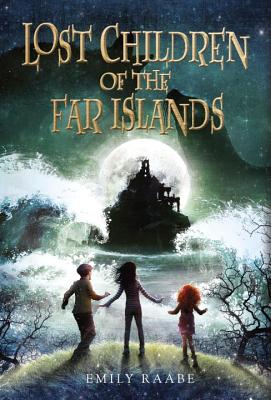 Last week, Emily Raabe, debut novelist of the recently published Lost Children of the Far Islands, and I traveled down to Pittsford, Vermont to the Lothrop School for their annual literacy night. Emily was our first-ever employee 17 years ago. It’s a real thrill to be able to sell her book! There is a lovely symmetry to that which delights me. Emily’s sister, Sara (also a former Flying Pig staffer), just happens to be the principal of the school. Their literacy night includes kids in jammies (see this post for how literacy night worked in Maine with Elizabeth Bluemle) and children having different classrooms to hear different stories, then coming back together as a group for an author reading.
Last week, Emily Raabe, debut novelist of the recently published Lost Children of the Far Islands, and I traveled down to Pittsford, Vermont to the Lothrop School for their annual literacy night. Emily was our first-ever employee 17 years ago. It’s a real thrill to be able to sell her book! There is a lovely symmetry to that which delights me. Emily’s sister, Sara (also a former Flying Pig staffer), just happens to be the principal of the school. Their literacy night includes kids in jammies (see this post for how literacy night worked in Maine with Elizabeth Bluemle) and children having different classrooms to hear different stories, then coming back together as a group for an author reading.
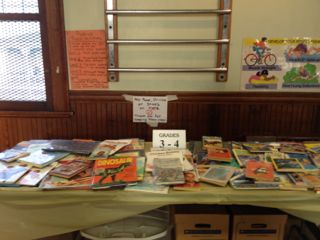
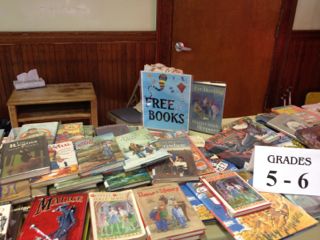 Of course the kids were adorable, and yes, there was much discussion about books and stories. But what made this event stand out were the free books for the kids. I walked in the gym and there were four tables of books arranged by ages from first grade right through fifth. As kids streamed into the gym they circled the tables and eyed the books they knew they couldn’t touch until after the presentation. The kids at this school are among Vermont’s rural poor with almost half of them qualifying for free lunches. Pittsford is a town that reflects the changing face of Vermont with a mix of farming kids and kids whose families have been caught up in heroin and meth addictions.
Of course the kids were adorable, and yes, there was much discussion about books and stories. But what made this event stand out were the free books for the kids. I walked in the gym and there were four tables of books arranged by ages from first grade right through fifth. As kids streamed into the gym they circled the tables and eyed the books they knew they couldn’t touch until after the presentation. The kids at this school are among Vermont’s rural poor with almost half of them qualifying for free lunches. Pittsford is a town that reflects the changing face of Vermont with a mix of farming kids and kids whose families have been caught up in heroin and meth addictions.
This was Emily’s first event for her book and she did really well. The kids seemed to have a hard time settling down and were a little chatty throughout her reading. While they may have been talking, they were paying good attention and asked many questions about the book and being a writer. One child asked, after hearing how many drafts Emily wrote, “Why don’t you have gray hair?” Emily deftly handled this one. She was also extremely kind when kids misheard her asking if they knew what a selkie myth was and hands shot up and a boy said, “I know what a selfie is: it’s when you take your picture with a phone.”
Kids bought Emily’s book and while they were waiting to get them personalized, the book tables were opened. Sara explained, “We’re going for controlled chaos.” Children streamed to the appropriate tables and carefully choose one book each that had been scoped out before. Every student left with a book. And I was left with a very happy feeling to be part of such of a special evening.
Successful School Visits
Josie Leavitt - April 14, 2014
School visits, if done well, can be win-win situations for the school, the author and the sponsoring bookstore. Bringing authors into a school is a gift for students, and often one that stays with young people for the rest of their lives. Often, if school visits are part of an author’s tour and that author is already going to the bookstore, the visit will be free. This is a huge boon to schools. The best school visit usually require at least one school staffer, often the librarian, to help organize and cheerlead the event. Below is a list of tips to make them as successful as possible.
– If a school, even the one that is most local to the bookstore, doesn’t actually order books from the bookstore, they are not likely to get offered visiting authors. This is definitely a case of helping the school that supports the store.
– Someone at the school must actually be excited about the visiting author. If there is tentativeness on the school’s part there is the potential for a bad visit. It’s totally okay to say no. The flip side of this works for stores, too.
– In a perfect world there would plenty of time to plan and perhaps do an author study and get the kids excited about meeting the author. We all know this is not a perfect world. But even with limited notice there are ways to get kids excited for author visits by reading the first few chapters of a book to the class in advance of the visit. It doesn’t take much to get kids intrigued by authors.
– Order forms must be easy and given to the school in a timely way. We offer our standard school discount to all books purchased for an author event. All order forms must be turned back to the bookstore at least a week prior to the event. I’m always surprised at what books the kids want and it’s often not the one the author is touring in support of; it’s usually the one you never expect and the one that’s hard to get. Allowing enough time to get the books in is vital.
– Bookstores must be really organized about the book orders and how the kids want them signed. I usually let Elizabeth do this for us. She’s meticulous and her system really works. Each child’s book(s) is rung up, the receipt stapled to the form and then the book is wrapped in the form. Then the books are organized by classroom and brought to the school for the author to sign.
– Authors need to make sure their computer/flashdrive/Power Point, etc works. Nothing is more frustrating than needing a Mac and only having PC things. I know it’s more to lug around, but if you bring your laptop from home, then you’ll know everything will likely work.
– Don’t schedule every minute of the day for the author. I know it’s a case of wanting to get the most out of the visit and getting as many kids to see the author as possible, but this is hard work and authors need time to eat, go to the bathroom and just breathe. Allowing breaks during the day just makes for better presentations throughout the day.
– Last tip: thank the author with something that’s easy to carry on a plane. Puppets and dioramas (I am not making this up) are lovely, but are really hard to travel with.
Fabulous First Lines, 2014 Edition, Round One
Elizabeth Bluemle - April 11, 2014
 While an exceptional first line is a wonderful thing, any superior delight it offers is actually lagniappe, since readers generally are willing to wade through a page or two—and usually at least a chapter—before abandoning a book as a lost cause. First lines are important, but they don’t carry the pressure of, say, the last line, which shoulders the entire narrative on its skinny self. All an opening line in a novel really needs to accomplish is to make you want to read on.
While an exceptional first line is a wonderful thing, any superior delight it offers is actually lagniappe, since readers generally are willing to wade through a page or two—and usually at least a chapter—before abandoning a book as a lost cause. First lines are important, but they don’t carry the pressure of, say, the last line, which shoulders the entire narrative on its skinny self. All an opening line in a novel really needs to accomplish is to make you want to read on.
That said, there’s a particular pleasure in a terrific first line. It sets the tone for the book, can establish a strong voice or setting, assist in building the fictional world, startle readers into unfamiliarity, make them laugh or gasp. The first line gives you a sense of the storyteller in whom you are placing your time and trust to lead you on a remarkable journey.
Twice before in ShelfTalker, I have collected fabulous first lines (2013, 2011) that caught my attention from the year’s new middle grade and young adult releases. Below are some of the standouts I’ve come across so far from the 2014 crop of ARCs.
This is just the first round; plenty of time for more of the best to surface! In December, we’ll vote for the absolute best first line of the year.
Enjoy, and please add your own 2014 discoveries in the comments section.
I’m the happiest guy alive, because Katrina M. Zabinski is my girlfriend. I’m also the most miserable guy who ever lived, because the pressure of having a girlfriend like Tina is crushing. —Family Ties by Gary Paulsen (Random House / Wendy Lamb)
My rules for the Black Market are simple. Don’t make eye contact—especially with men. Their faces are sharp, but their eyes are sharper, and you never want to draw that blade. —Sekret by Lindsay Smith (Roaring Brook)
Maximillian Reisman can stand on his head for thirty minutes if he wants to. —The Cracks in the Kingdom by Jaclyn Moriarty (Scholastic / Arthur A. Levine)
There’s something I need to tell you.
Don’t be mad.
Please. Please don’t be mad. I hate it when you’re mad at me.
—We Are the Goldens by Dana Reinhardt (Random House / Wendy Lamb)
No body meant no casket, so they used her headshot instead. This was a Hollywood funeral, after all. —A Hitch at the Fairmont by Jim Averbeck (Simon & Schuster / Atheneum)
When I first heard Gayle, I couldn’t tell if she was a bird or a girl. —Nightingale’s Nest by Nikki Loftin (Penguin / Razorbill)
Once upon a time there were two brothers, as alike to one another as you are to your own reflection. —The Witch’s Boy by Kelly Barnhill (Algonquin Young Readers)
In my life, I’d had my share of fights, sometimes with fists, sometimes with knives, occasionally with a sword. I’d faced opponents twice my size, twice as mean, and, as a general rule, uglier than I ever hoped to be. —The Shadow Throne by Jennifer A. Nielsen (Scholastic Press)
It looked like an ordinary package. —The Secret Box by Whitaker Ringwald (HarperCollins / Katherine Tegen)
I am Private First Class Daniel Christopher Wright, I am seventeen years old, and I fired the shot that ended the United States of America. —Divided We Fall by Trent Reedy (Scholastic / Arthur A. Levine)
I’d never seen a mock man until the Professor showed me one. —Threatened by Eliot Schrefer (Scholastic Press)
As Jackson Greene sped past the Maplewood Middle School cafeteria — his trademark red tie skewed slightly to the left, a yellow No. 2 pencil balanced behind his ear, and a small spiral-bound notebook tucked in his right jacket pocket — he found himself dangerously close to sliding back into the warm confines of scheming and pranking. —The Great Greene Heist by Varian Johnson (Scholastic / Arthur A. Levine)
What first lines have you loved this year?
Candlewick Gang Shares Spring Favorites
Elizabeth Bluemle - April 10, 2014
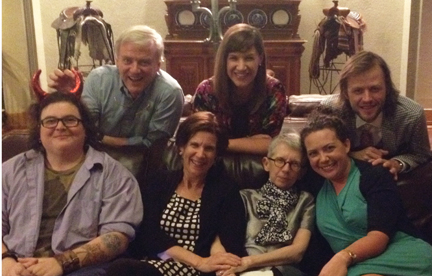
L to R: e.E. Charlton-Trujillo, Chris Van Dusen, Joan Powers, Andie Krawczyk, Sharon Hancock, Katie Cunningham, Mac Barnett
I have so much to share with ShelfTalker readers about this week’s Children’s Institute, as well as the Texas Library Association convention—but that will need to wait a bit, since these days have been nonstop, leaving little time to pull together coherent thoughts and create any kind of succinct account of the highlights. I promise all that is coming soon.
In the meantime, I was one of the guests at my publisher’s author/librarian dinner last night, and so I polled some Candlewick authors, artists (well, one artist), editors, and marketing folk about the spring 2014 book they’re most excited about at the moment. Here’s what they shared (note: for brevity’s sake, I note only the most recent release for each author and artist polled):
e.E. Charlton-Trujillo, author of Fat Angie: “I’m excited to read Katie Davis’s Dancing with the Devil, because it’s a book about overcoming victimization that doesn’t feel like a Lifetime movie. It’s about becoming your best self and about empowerment.”
Chris Van Dusen, artist of President Taft Is Stuck in the Bath: “Rules of Summer by Shaun Tan. His illustrations blow me away. He’s innovative, he always does something different, and you can expect the unexpected.”
Joan Powers, Candlewick editor: “There Will Be Bears by debut author Ryan Gebhart. It’s a middle grade book about hunting and meat and guns, none of which I like but all of which I love in this book.
Andie Krawczyk, Candlewick marketing: “The Strange and Beautiful Sorrows of Ava Lavender by Leslye Walton. It’s multigenerational magical realism, which I’m not usually a fan of, but I am in this book. The writing is lyrical. Even the book design is impeccable.”
Sharon Hancock, Candlewick marketing: “Swim That Rock by John Rocco and Jay Primiano. It’s a compelling coming-of-age story in a blue-collar quahogging community.” (Apologies to Sharon for catching her with her eyes closed. She was not asleep – just blinking!)
Katie Cunningham, Candlewick editor: “I absolutely adore Two Speckled Eggs by Jennifer K. Mann. I like that it explores female friendships in a genuine way. And I really love the scene with the party hats!”
Mac Barnett, author of President Taft is Stuck in the Bath! “The Meaning of Maggie by Megan Jean Sovern. It’s super good. It’s got that intangible thing people are talking about when they say ‘voice.’ It’s perfect voice.”
Totes to Texas
Josie Leavitt - April 8, 2014
I never knew how many people collected flying pigs until we opened the store in 1996. Collectors come in varied ages, with a slight tip towards women, but a surprising number of men also collect all manner of flying pigs. We usually have people eyeing our four shelves of flying pigs that have been given to us throughout the years. They look so disappointed when I tell them they’re not for sale.
Last week we got an email from someone inquiring about any flying pig collectibles. I wrote back and said we had finger puppets and our own Flying Pig tote bags and I could easily send both to her. She called later that day. Becky, was calling from Austin, Texas. We don’t have many customers – okay, any – customers from Texas, so this was a surprise. She has a collection of over 200 flying pigs, she said she wanted the tote bag. I asked, “Not the finger puppet as well?” To which to she said, like a true collector, “Is it the small one from Folkmanis with the magnetic nose?” Well, yes it is. Clearly, she already had this one. If you don’t know these puppets, they are wonderful. And the magnetic noses mean they can stick to a lot of things, including each other, which is just adorable. I always know I’m driving too fast when my paired piglets fly off my rearview mirror.
said we had finger puppets and our own Flying Pig tote bags and I could easily send both to her. She called later that day. Becky, was calling from Austin, Texas. We don’t have many customers – okay, any – customers from Texas, so this was a surprise. She has a collection of over 200 flying pigs, she said she wanted the tote bag. I asked, “Not the finger puppet as well?” To which to she said, like a true collector, “Is it the small one from Folkmanis with the magnetic nose?” Well, yes it is. Clearly, she already had this one. If you don’t know these puppets, they are wonderful. And the magnetic noses mean they can stick to a lot of things, including each other, which is just adorable. I always know I’m driving too fast when my paired piglets fly off my rearview mirror.
Becky happily asked for a tote bag. Which I popped in an envelope and mailed off. But first, I had to ask her how she found us. I thought she had done an internet search for flying pig things, but actually not. She had gotten a poem in her email that somehow led her to Kate Messner’s website. Kate, of course, is a very talented writer of many books for children, and a great customer of the Flying Pig, who links to our store on her website. Once that link was made, Becky contacted us for memorabilia. So, in the ever increasing connectedness of the internet, another flying pig found a home.
Pretty nifty.
Books That Make You Sob
Josie Leavitt - April 7, 2014
As booksellers, we read a lot of books. Hundreds a year in all likelihood and there are books that stay with us for their humor and their characters. Some books combine all the great things of a  memorable story coupled with deep sadness. Not the kind of sadness that is fleeting, but the kind that flat-out makes you sob. I am the first to admit that I weep easily and often if I’m moved, but there are books that just crush me. There is nothing wrong with crying with books because the emotions are real. I refuse to read books where animals die because that simply slays me.(why people dying isn’t the same is worth looking at, but that’s a blog post for another day).
memorable story coupled with deep sadness. Not the kind of sadness that is fleeting, but the kind that flat-out makes you sob. I am the first to admit that I weep easily and often if I’m moved, but there are books that just crush me. There is nothing wrong with crying with books because the emotions are real. I refuse to read books where animals die because that simply slays me.(why people dying isn’t the same is worth looking at, but that’s a blog post for another day).
It’s funny – as a kid I don’t really remember crying at books or stories. When I was sixth grade, my teacher, Mrs. Groupe, read Truman Capote’s A Christmas Memory and she started sobbing halfway through and never recovered. I cried more at her sadness than what was happening in the story. Teachers weren’t supposed to cry.
Books six and seven of the Harry Potter series had me crying so hard, a friend came outside to the deck where I was reading to offer solace, tissues and plea to not reveal the ending. But let’s face it, if you were a Harry Potter fan, how could you not shed a tear or two, or hundreds at the deaths of Dumbledore and Fred Weasley. And Dobby’s brave sacrifice just about killed me. When I tear up talking about these things with kids they think I’m a little crazy. This brings up the point that the sobbing that adults do at kids’ books often makes up for the tears the kids don’t shed. It’s always struck me as funny that there’s not a grown-up around who can’t stem the tears when reading Charlotte’s Web and yet I’ve not met a kid who has cried at that book. Perhaps it’s more a sense of the sentimental that children do not yet posses, but it’s always struck me as funny.
The Fault in Our Stars found me crying so hard at the ending that my dog, Ink, became so alarmed he jumped on my chest and started to lick at my face. This served two purposes. His jumping up was funny enough that it got me to stop crying for at least a minute while I explained to Elizabeth why I was practically convulsed with tears, and his insistence on licking my face grossed me out enough that I sat up and pulled myself together.
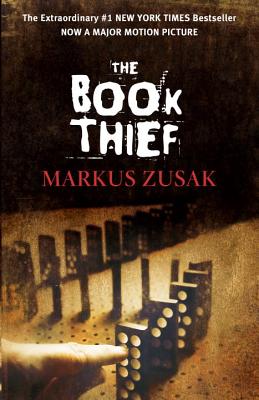 And lastly, the book has left many adults stunned: The Book Thief. I found myself crying throughout that book but devastated at the end, and not just from sadness but from the beauty of the ending. I’ve had many customers tell me that this was the book they read in public and regretted it. When I sell this book and other books that are surprisingly sad I always warn folks not read them in public, or at least have tissues handy and be prepared to have kindly strangers ask if they’re okay.
And lastly, the book has left many adults stunned: The Book Thief. I found myself crying throughout that book but devastated at the end, and not just from sadness but from the beauty of the ending. I’ve had many customers tell me that this was the book they read in public and regretted it. When I sell this book and other books that are surprisingly sad I always warn folks not read them in public, or at least have tissues handy and be prepared to have kindly strangers ask if they’re okay.
What are some of the saddest books you’ve read?
To Host or Not to Host?
Josie Leavitt - April 3, 2014
We were recently approached by an author wanting to do an event with us for his Vermont history book. Local authors are lovely and they should be supported, but how to do to that when their book is published by Amazon? The book was published by CreateSpace, which is Amazon’s independent publishing arm. This was the first time I’ve been speechless at the store. I punted by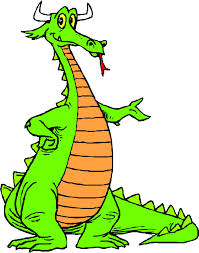
The more I thought about this the angrier I got. I know the author wasn’t thinking about the larger picture. He was understandably proud of his book and wanted to set up as many events as possible. I just couldn’t say yes right away. I left word with Elizabeth about it and she wondered if we could get the books on consignment from the author. This at least saves us from ordering directly from Amazon. Then I posted on the NECBA listserv to get advice from other booksellers.
Elizabeth’s point is an excellent one and one that was echoed by other booksellers. Getting the books directly from a local author is probably the best thing to do. Several colleagues responded privately that it was galling to be asked by authors to provide the one thing Amazon cannot: a connection with real people. Authors smartly know that events are a great way to reach people. And while Amazon is great at suggesting other titles you might like, they can’t compete with a one-on-one connection borne out of people being in the same room talking about books.
I am still struggling with this. I know Amazon doesn’t really care about my little store, but increasingly, I’m forced to try and compete with them on price on a weekly, if not daily basis. It is easy to characterize Amazon as the big bad monster, but when an actual Vermonter comes in with his book, it’s hard to say no. So, with a small dose of education about why shopping locally is not important, it’s vital, I will likely host this event.
Booksellers and authors: what are your thoughts on events with Amazon-published authors?
